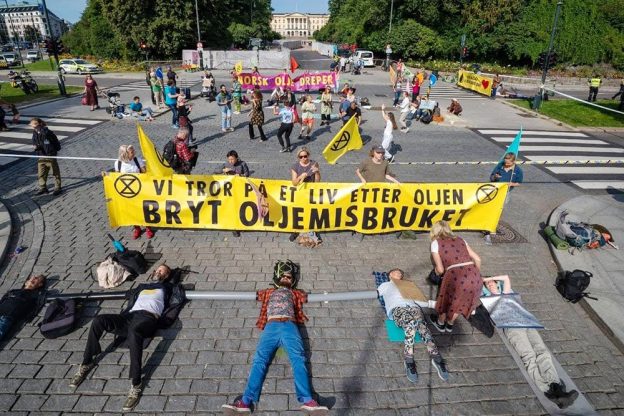At a time when global warming stokes ever more extreme weather, the global rise of climate-denialist right-wing populism not only impedes effective responses, but also raises the specter of a dystopian fascist future. Continue reading


At a time when global warming stokes ever more extreme weather, the global rise of climate-denialist right-wing populism not only impedes effective responses, but also raises the specter of a dystopian fascist future. Continue reading

You can have a scientifically rigorous diagnosis of climate change, together with a plethora of reasonable policies to tackle the problem, but if your program lacks a strong coalition and powerful political strategy, it will fail. Continue reading

New York Times technology reporter Kevin Roose begins his new book with some good news.
Futureproof: Nine Rules for Humans in the Age of Automation, (2021) adopts an upbeat tone in proposing how we might live well in this age of automation. “Artificial intelligence could be unbelievably good for humankind, if we do it right. A world filled with AI could also be filled with human creativity, meaningful work and strong communities.” Furthermore, artificial intelligence and automation “could bring us together, armed with new superpowers, to solve some of our biggest problems.” What problems? Big, big ones: to “eliminate poverty, cure diseases, solve climate change, and fight systemic racism.” Great!
But his repeated use of the conditional verb “could” evokes caution. Is this vision only hypothetical?
It appears to be so: Roose notes that “none of this will happen without us.” Well, that’s not a surprise. What do “we” need to do?
Therein lies the rub. Roose offers no plan because he lacks a problematic. Yes, he is rightfully skeptical “that the private sector will save us.” Yes, he thinks a strong welfare state and extensive retraining programs are needed to handle the disruptions. Yes, he implores us to stop bowling alone and recreate community in order to back “collective action.” But how do we overcome atomization, and for what sort of joint action? No answer, except for a stirring call to “arm the rebels” within the high-tech oligopolies – the usual suspects: Amazon, Google, Apple, Facebook, Alibaba, Microsoft, and others. Well, that’s something of a political nature.
But very thin gruel. Roose’s idea of arming tech rebels fighting for “ethics and transparency” is to provide them with “tools, data and emotional support.” That doesn’t sound promising, though further revelations of algorithmic manipulations and the unsavoury military contracts of big tech are important.
Not surprisingly, with little to offer, Roose concludes by urging his readers not to get “too discouraged.” If “we” are determined, “we” may still harness technology for the common good.
Am I too harsh in my judgment? You judge. Roose’s approach is emblematic of what we might term a “progressive neoliberal” stance. That stance deplores certain social trends, hopes for good social and ecological outcomes, but it hasn’t a clue how to bring them about. The failure stems from avoiding an analysis of systemic power relations, of which technological development is one pillar. The analyst turns instead to the easier question of how individuals can best accommodate existing trends. The author’s “Nine Rules for Humans in the Age of Automation” enumerate common-sensical ways in which humans can individually adapt to, and perhaps even thrive with, this runaway monster. Believing that another glorious world is possible leads nowhere if you lack a strategy.
But you may ask: is there really a problem with AI that requires a problematic? Can’t we just keep clicking happily away on our phones while hoping for the best? After all, learned economists claim that, in the long run, everyone benefits from automation because more and better jobs are created than are lost. Overall, living standards and satisfactions allegedly rise. Let’s click and be happy!
Sorry, no. The techno-optimists’ view is suspect. Although saying a good word on behalf of the machine-wrecking Luddites is considered a mark of intellectual ineptitude, we may at least understand their anger. The following questions just touch the surface of what is at issue:
Yes, there is a problem with AI. We live in a world faced with destruction from new generations of nuclear weapons, hatred spawned by the manipulated identities of those left behind by technological and social change, and accelerating global warming. All these problems grow worse as companies devote billions of dollars, thousands of PhDs, and millions of hours to perfecting algorithms to control our shopping and political preferences. From a societal viewpoint, it’s mad.
Thus, we return to the issue of a problematic. Lacking a problematic is a debilitating weakness when it comes to harnessing technological development. If you don’t understand the dynamics, you can’t think through feasible means of taming the beast.
So what is the problematic? It is devastatingly simple. I learned this truth years ago when I taught the political economy of technological change. Technological development is not a force of nature; it does not just happen. There are many innovations and inventions that could be harnessed. Those that come to fruition – receive finance and nurture – are the ones that suit the economic and power interests of the dominant elites. This self-evident truth increasingly applies to university-based research as well as commercial research. The incentives make it so.
Strategically, the implication is that if you want to change the pattern of technological development, you have to challenge the power structure. Roose is right: artificial intelligence could be “unbelievably good for humankind.” With enhanced productivity and new ways of interacting, we could solve our major problems and extend the realm of freedom for all. But not by following Roose’s nine rules of individual adaptation. Yes, “none of this will happen without us.” Yet that admonition requires substance.
Can “we” take on power structures? Can we organize a progressive mass movement that avoids the usual problems of sectarianism, identity clashes and schism? Can we develop a program that might have wide appeal, despite the rise of populist-nativism? It is a daunting challenge, especially in this age of surveillance capitalism powered by AI. But we have no other option but to try – if we want to be “futureproof.”
[header image: Image by Gerd Altmann from Pixabay]

Strangely, reading Albert Camus’ The Plague (1947) during the pandemic did not depress me (further). Instead, I felt exhilarated. Yes, Camus depicts widespread despair in Oran (Mediterranean city in Algeria) as it undergoes months of quarantine. Fear and unrest rise as bubonic plague kills thousands each month But, as usual with Camus, his ideas are engaging.
Camus has intrigued me since undergraduate days. As a young man, I identified with his defiant attitude in “The Myth of Sisyphus” and L’étranger. Yes, our lives are utterly absurd in the sense of meaningless. But, despite all, including an empty heaven, we live. We may be Sisyphus with his futile unending task of pushing a boulder up a hill. However, we endure, and we can even imagine Sisyphus happy. Why? Because we devise our own meaning.
As an older man re-visiting these works, I found that defiance less satisfying. Perhaps age dulls the sense of possibility. In any case, in The Plague Camus is less defiant, more humble, and distinctly chilling.
The crux of the novel arrives at the beginning, when the narrator (Dr Rieux, as it turns out) observes that people consider themselves free, but “no one will be free as long as there are pestilences.” This observation has both an obvious, and a less obvious, meaning.
Obviously, epidemics and pandemics curb the freedom of everyone. People spend aimless days of high tension, mourn their dead, and are restricted to concentration camps if exposed to the virus. Even so, the experience of the people of Oran is, in some ways, not as dire as ours: people flock to bars, restaurants, cinemas and beaches, despite the contagion. No social distancing there, surprisingly.
People wait to be freed from the pestilence. Religion offers little consolation. Father Paneloux, his own faith in doubt, pleads for people to surrender to “God’s will”, not to question a fate that is all part of His design. Dr Rieux, the good doctor, is unpersuaded. We can count only on ourselves, he thinks. God remains mute in his heaven, in the face of all atrocities. Rieux, the model of an ethical and thoughtful person, acts to heal the afflicted purely out of common decency. That is all one can rely on.
At the less obvious level, the plague represents the propensity within humans for violence and murder. Tarrou, a visitor to Oran of mysterious origins, develops this idea in conversation with Rieux. Other reviewers have represented the plague as fascism, but I see no evidence for this interpretation. Although the story is deliberately obscure, a youthful Tarrou apparently participated in a radical left-wing group that assassinated people to advance a Utopian future. He later realizes a bitter truth: not only is killing never justified by any principle, but also, and more unsettling, “we all have the plague, and I have lost my peace.” The virus – the propensity for violence – may remain dormant for a while, but it never disappears. It will become virulent again and the contagion will spread.
So how do we live? Only by being perpetually on guard against the resurgence of the pestilence and taking the side of victims. “While unable to be saints but refusing to bow down to pestilence,” we must “strive our utmost to be healers.”
Are we humans worth saving, if our basic natures are so debased? Yes, says Camus, in a carefully balanced judgment . “There are more things to admire in people than despise.” We hope he is right. We hope to encounter many Dr Rieux, to become Dr Rieux. But one thing is certain; indeed, it is the key lesson. To achieve peace, both in the political and the personal sense, we must be true healers. We must be alert to, and act against, the pandemic within.
Richard Sandbrook is Professor Emeritus of Political Science at the University of Toronto and President of Science for Peace Canada.
Image by Random House.

“Winning is a moral imperative. The stakes are too high, and time is too short, to settle for anything else.” Naomi Klein addressed these words to the British Labour Party, but they aptly express the urgency of the climate movement today. Continue reading
Fascist politics poses a major challenge in the years ahead. “How do we maintain a sense of common humanity,” asks Jason Stanley in his brilliant How Fascism Works , “when fear and insecurity will lead us to flee into the comforting arms of mythic superiority in vain pursuit of a sense of dignity?” We may know the danger exists, but at what point do we take it seriously? Continue reading
“They that sow the wind, shall reap the whirlwind.” Neoliberalism as an ideology and a movement demonstrates the truth of this biblical adage. Neofascism is the whirlwind. Continue reading
“Life is man’s missed opportunity.” Although Karl Polanyi used these words to sum up Hamlet, they also encapsulate his sense after 1947 that capitalist society had forfeited a promising future – a liberating freedom in community. Yet perhaps the opportunity has not been forfeited but delayed. Polanyi’s insight into the connection among freedom, community and personal responsibility can still guide us. Continue reading
Both Karl Polanyi and Friedrich Hayek addressed the ‘big’ question of how we can attain freedom in a complex society. Despite sharing similar backgrounds and experiences, they famously arrived at divergent conclusions. Who is right? Continue reading
Nearly everyone agrees that the left is a mess. The main clash in most Western countries today pits mainstream neoliberals against right-wing authoritarian populists, with the latter channeling the rage instigated by the policies of the former. The mainstream social-democratic parties in Europe are in electoral free-fall. The ‘Pink Tide’ in Latin America has rapidly receded (with a couple of exceptions). And far-right populism is becoming the movement of the traditional working class. A crisis may erupt at any time in the form of another financial meltdown, an ecological disaster, an authoritarian reaction or a foreign-policy miscalculation. Continue reading